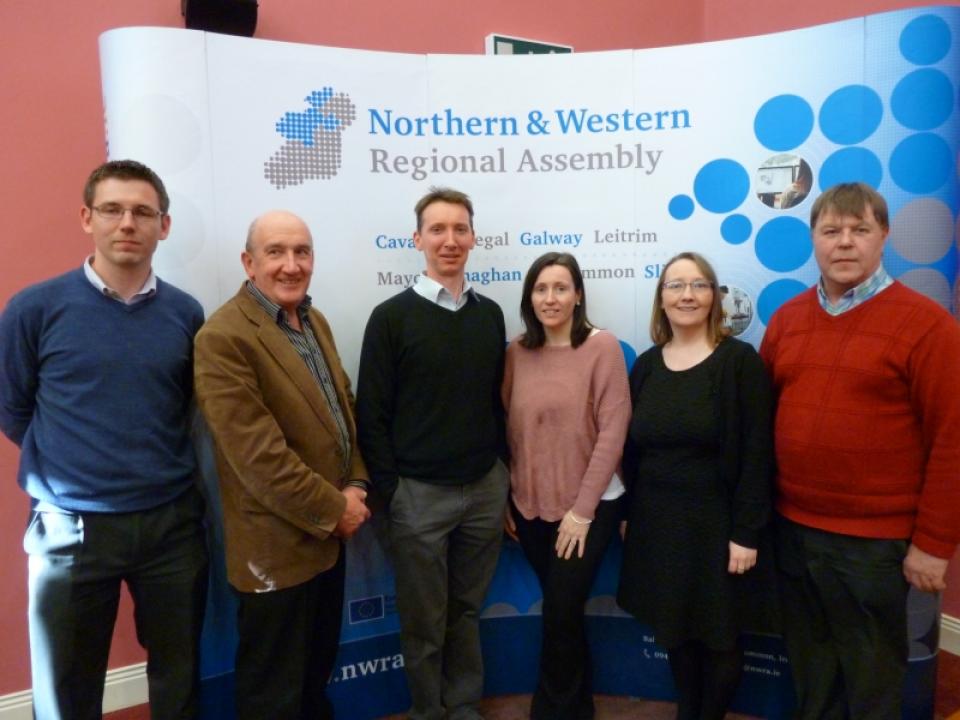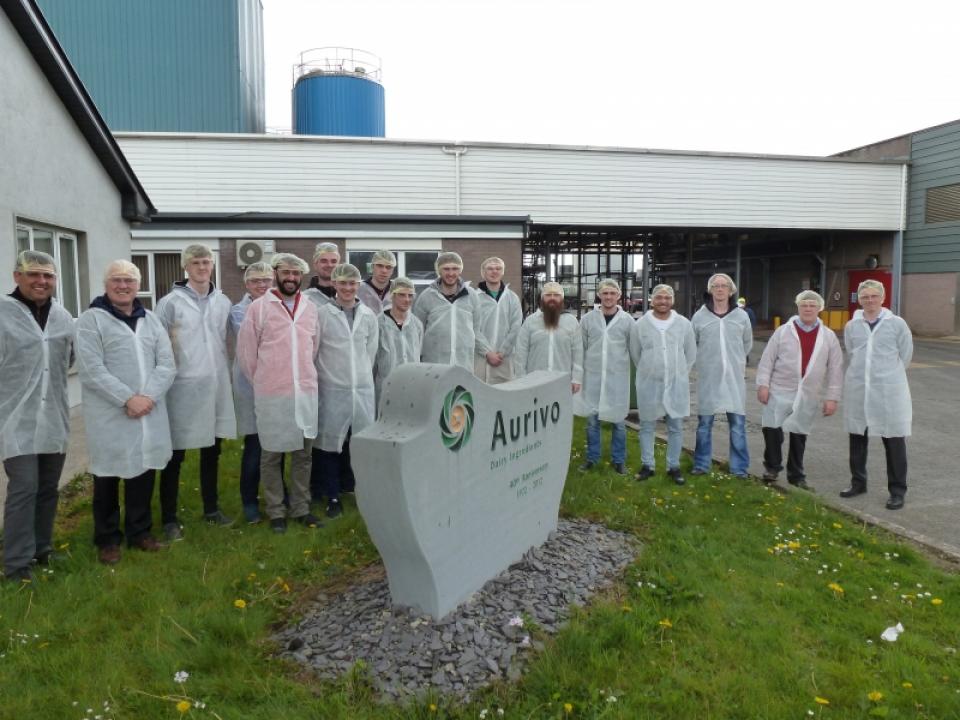Excellent career prospects for energy engineering graduates as sector grows
Graduate Survey finds 94% in employment and 6% in further study
As the Government plans Ireland’s transition to a low carbon, climate resilient and environmentally sustainable economy in Ireland’s first National Mitigation Plan due on 10 June, a survey of GMIT’s energy engineering graduates shows that they are already delivering these key goals of the Mitigation Plan. The survey of GMIT’s energy engineering graduates (2012 to 2015) shows 94% are employed in a wide range of exciting and rewarding roles, while the remaining 6% choose to pursue further education.
Leaving Cert and mature students still have time to apply, through the CAO Change of Mind until 1 July, for GMIT’s Bachelor of Engineering (Ord) Energy Engineering and Bachelor of Engineering (Hons) Energy Engineering courses which are accredited by Engineers Ireland.
“The main job of an energy engineer is to find the most efficient and sustainable way to power our homes, businesses and industrial processes into the future” explains Dr Oliver Mulryan, Programme Course Co-ordinator, GMIT. “Our survey confirms that there is a strong demand for such roles in Ireland. Indeed, many of this year’s final year class have already secured employment prior to their final exams.”
“Graduates can look forward to careers in a wide range of well-paid engineering, technical and managerial roles within multinationals, indigenous Irish businesses and the public sector. These roles have job titles such as Energy Managers, Facilities Engineer, Product Design Engineers, Heating-Ventilation Design Engineers, Project Managers & Engineers, Energy Assessors & Consultants, Energy Network Managers & Controllers, and in areas such as Mechanical & Building Services, Energy Efficiency & Recovery, Energy Distribution, Building Energy Management, New Product Design & Development and more.”
“Our energy engineering graduates are employed by companies such as Allergan, BOC, Coffey Water, Eirgrid, ESB Networks, Intel, Jones Engineering Group, Joule Ireland, ProAir, Shell, Thermo King, Unitherm Heating, Valeo, and many others”, adds Dr Mulryan.
GMIT’s School of Engineering collaborates closely with the Irish energy industry on course design and development and facilitating knowledge transfer between industry and students via many modes. These include industry placement, site visits and invited guest lectures, as well as industry exhibitions and technical talks during GMIT’s Annual Energy Awareness Day which takes place in October each year.
During a recent student site visit to Aurivo’s Dairy at Ballaghadereen, Co Roscommon, GMIT’s Energy Engineering students saw at first hand the very positive contributions that their energy engineering profession makes to the viability of such a large enterprise. It was clearly demonstrated how the energy engineering role significantly improved process energy efficiency and how an oil-fueled steam generation plant was replaced by an Irish designed, wood-chip fueled steam boiler.
Energy & Projects Manager Marty Dervin said “we are continually looking for new and innovative methods to improve performance and reduce energy consumption, and we know that the energy engineers of the future will be pivotal in assisting in this going forward. We were delighted to be able to meet the current Energy Engineering students from GMIT during a site visit and look forward to the next visit.”
GMIT’s Energy Engineering Course lecturer, Dr John Lohan says: “The site visit to the Aurivo Dairy provided an excellent student learning experience. In the classroom, energy students are constantly reassured that they will play a central role in boosting the competitiveness of Irish industry by implementing innovative energy efficiency measures and low-carbon energy technologies. However, it all seems a bit distant and way-off in the future after graduation, but their visit to Aurivo showed them it’s all happening now. Aurivo is a striking example of a very innovative indigenous enterprise that has not only achieved greater energy efficiency and deployed sustainable heating systems, but emphasises that these measures are cost effective and essential if the company is to retain its competitive edge in a global market.”
During the visit students visited the Plant room and learned of the essential technical and interpersonal skills required of an energy engineer. Energy & Projects Manager, Marty Dervin, said “Aurivo’s dairy business is a global supplier of innovative, value-added, sustainable dairy ingredients and consumer foods solutions. We are committed to developing sustainable processes through operational efficiency and the use of biofuels such as Woodchip which we currently use in our Dairy Ingredients business. We have invested heavily in the past number of years in order reduce our impact on the environment in which we operate. Improving operational efficiency and ensuring security of fuel supply is essential for the continuity of our business. Some of the projects which have assisted us with regard to this include the implementation of an energy management system aligned to ISO50001 at our Dairy Ingredients site; Installation of a 15 tonne per hour biomass steam boiler; Development of Lean manufacturing practices throughout the business; Special Investigations on utilities and opportunities with the assistance of SEAI.”
Mr Dervin stressed the importance of both internal teamwork and external networks to deliver such projects and acknowledged the critical contribution of external stakeholders such as Optien Ltd, the Western Development Commission and the Sustainable Energy Authority of Ireland (SEAI).
Colin Donoghue, Energy Engineer with performance consultants Optien Ltd (Co Cork), also on-site during the student visit, says: “We are currently going through a significant cultural and economic energy revolution on an international scale. In order to mitigate against climate change and assist us in reaching 2020 targets and beyond, a multipronged approach is required. For this reason there are a wide range of opportunities available to today’s engineers who are passionate about energy. These include research and development of new and improved energy conversion technologies; implementation of energy management systems aligned to ISO50001; management of energy in large scale multinational organisations; driving operational efficiency initiatives to both increase production output and in hand reduce energy consumption; energy efficient design reviews of large scale projects; and project management of plant and equipment upgrades and installation.”
“We were delighted to be able to meet with GMIT’s future Energy Engineering graduates at the Aurivo manufacturing. It was encouraging so see the enthusiasm of the students on the day and we look forward to working alongside some of them in the future. Energy Engineers who are dynamic problem solvers with a good aptitude for STEM subjects and strong communication skills will go far in this industry. We not only need to be able to determine the opportunities, but also convince management and staff at all levels of the organisation to invest in the development of new processes, technologies and ways to thinking.”
The GMIT students also visited the nearby office of the Western Development Commission where Marty Dervin acknowledged the support received from the Commission to facilitate networking and information transfer from international energy consultants and technology experts.
For more information on the GMIT Energy Engineering courses, visit:
https://www.gmit.ie/mechanical-industrial-engineering/bachelor-engineer…

